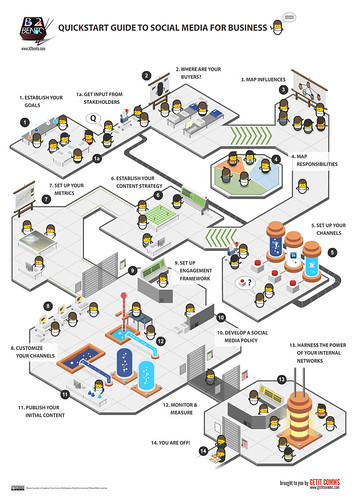If you wanted to get your small business some attention a few years ago, then you would have to commit to spending a large portion of your marketing budget on advertising.
That strategy worked well. Until it didn’t.
As the audiences for traditional mass-media channels became more fragmented, and people started paying attention to new things, your marketing ROI has fallen drastically.
Even large, established brands like American Express started turning to social media to create media marketing assets that will appreciate in value.
Today, businesses can use social media to reach people on a daily basis.
Anyone can launch a new website, come up with blog content ideas and start building an audience immediately.
But it’s hard because of all the noise and competition online.
So if you want to get attention from prospective customers, then you need to set yourself apart from everyone else.
Here are 3 ways small businesses can stand out using social media.

Image courtesy of Social Media Max
1. Have a Voice
One of the most important elements every business needs is a unique voice and personality.
This is especially true online. People want to connect with other people, not nameless, faceless companies.
And large companies still don’t understand this.
I was recently at a conference, and one of the panelists was in charge of PR for a large national hospitality company.
She was explaining how her Legal department has given her a list of acceptable “social media responses”. She and her team weren’t allowed to deviate from that list. If they wanted to respond to someone’s specific question or concern differently, then they had to run it through the Legal department first.
That is the exact opposite of how social media works. No potential (or current) customer will feel passionate about a brand that hides behind a list of standard, canned responses.
And by the time someone in PR gets an answer from the Legal department and responds to the customer, they probably forgot they asked a question in the first place.
So every small business can be more human, and use speed to your advantage.
2. Stand for Something
Small businesses can set themselves apart from the pack by standing for something. You need to believe in a cause, a movement, or a way of doing business.
What separates the companies with fans, from companies that compete on price, is that they believe in something bigger than themselves.
Simon Sinek has a great TED talk about how “people don’t buy what you do, they buy why you do it”.
Most businesses start by answering “What” you do. Like selling some type of service or producing a specific product. Other companies talk about “How” they do it, like your unique selling proposition or positioning statement.
But truly successful and popular companies, like Apple, start with “Why” they do it. They have a bigger cause and movement, and that inspires other people.
Almost every product or service you can sell today is a commodity.
So you need to realize that people don’t buy your “product” or “service”, they’re buying a solution.
Simon’s talk hits this point home and gives you pointers on how your business can create it’s own “Why” statement.
3. Have Enemies
If your business is going to have a personality and stand for something, then there needs to be other examples that you don’t agree with.
These could be other companies, philosophies or ways of doing business.
If you believe in organic food and clean eating, then your enemy is cancer, malnutrition, and fast food companies who are poisoning our youth.
If you believe in white-hat SEO, then your enemy is every company and person that thinks spamming, manipulation and short-cuts are the way to success.
Because you’re not trying to market to everyone.
You’re trying to market to customers that buy into your worldview.
One of the best ways to connect with other people, and get them emotionally engaged, is by sharing a common bond and rallying against a common threat.
And if you want people’s attention, then you need to get them to care.
That’s one of the best ways to use social media for business.


